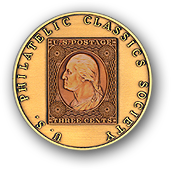Clarence Brazer (1880-1956) was for decades the recognized expert of essays and proofs. His published works continue to be the authoritative sources for collectors and students of essays and proofs. A relentless researcher, Brazer haunted the National Archives during the 1930s and 1940s. He carefully hand copied the National Archives’ correspondence files of the 1840s – 1880s between the Post Office Department and the various companies that bid for stamp-printing contracts. He took these copies back to New York City, had them typed and placed the typed copies into files corresponding to the various stamp issues. He also retained his extensive correspondence with fellow researchers and clients, collected a wide variety of key journal articles on essays and proofs, and obtained copies of virtually all the patent applications relating to the production of U.S. stamps. He also kept copies of the legal documents associated with the arrest and trial of Arthur Travers. This trove, much of it critical original source information, constitutes the Brazer Archive.
Where has the archive been since 1956? Following Brazer’s death, his family gave their pre-Revolutionary War period home to the local historical society and sold the contents of the house at an estate sale. When people began asking about the archive, it was missing and feared lost when the contents of the house were sold. Brazer’s stock of essays and proofs were sold to Morton Dean Joyce and later was included in the Brazer/Joyce sale by Robert A. Siegel Auctions (sale 726) in June 1990.
The archive was not with the collection, however. It turned up in the files of Brazer’s long time pupil, collaborator and friend, Falk Finkelburg. Days before the 1999 Siegel Sale of Finkelburg’s essays and proofs collection stamp dealer, Classics Society member and regional vice-president James E. Lee went to the home of Falk’s daughter and son-in-law to appraise his papers. There, Lee discovered the Brazer archive commingled with Finkelburg’s papers.
In 1999, Lee acquired Brazer’s archive from the Finkelburg family. Lee graciously allowed the Classic Society to scan and post the entire archive on its website, after which the archive was donated to the APRL for permanent safekeeping and public use. The Classics Society is proud and delighted to make the Brazer archive available to researchers, students and collectors worldwide and is extremely grateful to Jim Lee for making it possible.
The archive is organized by subject-matter groups and chronologically within each group.

